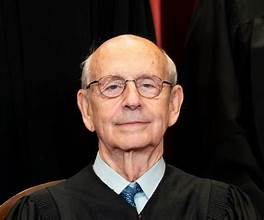Breyer indicates support for age limits for Supreme Court Justices

“I don’t think that’s harmful,” he said of Supreme Court terms in an NBC “Meet the Press” interview with Kristen Welker on Sunday. “If you had long terms, for example, they’d have to be long. Why long? Because I don’t think you want someone who’s appointed to the Supreme Court to be thinking about his next job.”
“And so, a 20-year term? I don’t know, 18? Long term? Fine. Fine,” he said. “I don’t think that would be harmful. I think it would have helped, in my case. It would have avoided, for me, going through difficult decisions when you retire. What’s the right time? And so, that would be okay.”
Court age limits and terms are again at the forefront of debate as Justice Sonia Sotomayor faces pressure from Democrats to retire, given health concerns and the uncertainty of the 2024 election. Both Breyer and Sotomayor are liberal justices.
Breyer also declined to weigh in on recent Supreme Court cases regarding former President Trump’s legal troubles, specifically over whether Trump is allowed to be disqualified from the ballot due to the 14th Amendment, which the court rejected, and the to-be-decided case over whether he can face criminal charges over his actions surrounding Jan. 6.
“I’m not going to answer that. Why? Because I think one of the really unfortunate things I could do is retire from the court and then sit here and criticize particular cases or not criticize them,” he said.
“I’m not in the position, unlike you. You can do it,” he told Welker. “But I think publicly praising or blaming particular decisions that the court now makes– you want to go ba– I can tell you, I can criticize some. Dred Scott was a terrible decision, and so forth, and Brown v. Board of Education was a very good one. We can go back in time.”
“But I don’t think I can really go into discussing the merits of recent decisions,” he added.
The justice similarly dodged specifics on the leak of Justice Samuel Alito’s decision in the Dobbs abortion decision in 2022, which he only described as “unfortunate,” refusing to expand.
Source: THE HILL



